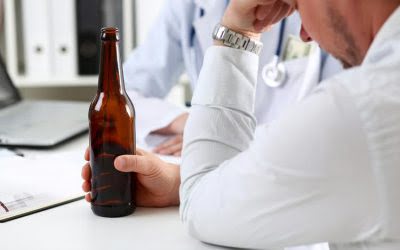First, analyses indicated that a proclivity toward disengagement coping in the context of prior social stressors accounted for a significant proportion of the relation between social anxiety and the precursors to drinking behavior assessed here. The current study replicated prior work, indicating a positive relation between level of social anxiety and coping motives for alcohol use after accounting for variance attributed to frequency of use. Finally, social anxiety also was similarly related to adolescents’ current desire to drink upon introduction to the novel, socially-relevant laboratory environment.
2. Impact of Alcohol Consumption on Liver Function

The mental effects of alcohol use and misuse are far-reaching, whether in a social or personal setting. Heavy alcoholism use or borderline alcoholism increases the risk of developing alcohol use disorder (AUD). The best course of treatment will depend on the severity of your addiction, the “root” of the problem, and the situations you are using alcohol to cope with. But once you find the ideal treatment, replacing alcohol as a coping mechanism for social anxiety will become a reality. Remember that you can always contact Bright Futures Treatment Center and have each treatment modality thoroughly explained to you. Sometimes, there is not much you can actually do about your social anxiety on your own.
GAD is characterized by excessive, uncontrollable worry about various aspects of life, such as work, health, and social interactions. People with GAD often experience physical symptoms like muscle tension, fatigue, and restlessness alongside their persistent anxiety. Anxiety is a natural response to stress, characterized by feelings of worry, fear, and apprehension.
The EAP is Here to Support those Impacted by Current Events
If you find yourself leaning on alcohol to cope with emotional challenges, you may want to consider reaching out for help. Alcohol increases your levels of GABA, a neurotransmitter that has a calming effect. Your brain responds to this increase by making more glutamate, increasing brain activity. Increasing awareness leads to better understanding and empathy, paving the way for more effective interventions and support systems. Community support plays a pivotal role in helping individuals recover and maintain their well-being.
Treatment of Social Anxiety Disorder
Analysis with these variables will be adjusted for initial cortisol concentration to alleviate confounding risk as AUC variables may be comprised of variance due to stress reactivity and stress-unrelated HPA axis activity 113. All analysis including cortisol secretion during the TSST will be run twice with all participants in the first and with exclusion of non-responders to the TSST (increase of 1.5 nmol/l compared to baseline 114) in the second run. With regard to alpha-amylase, both AUC measures and peak minus baseline levels will be calculated. While it might be tempting to rely on unhealthy mechanisms for temporary relief, they often deepen the cycle of anxiety and can complicate recovery efforts. As the initial relief fades, individuals may find themselves trapped in a cycle of guilt and shame. This can further intensify anxiety and lead to a reliance on these harmful behaviors.
Indirect Effects for Major Depressive Disorder at age 28 – 30

Evidence suggests good reliability between telephone and face-to-face diagnostic interviews (Briere et al., 2014). NIAAA has released a major update to the Alcohol Facts and Statistics webpage. The content of this popular online resource has been expanded with demographic and other data and is now reorganized for improved readability and easier navigability. Drinking alcohol can affect your body in all sorts of different ways; explore some of the most common effects on our what is alcoholism body map. People need to speak with a doctor if they are experiencing the above effects due to alcohol. Your partner, parents, children, friends, employer, coworkers, doctor, or therapist might confront you about your drinking habits or your behavior when you drink.
- Larger prospective studies are warranted to elucidate the long-term effects of antidepressant treatment on liver function and glycemic control in patients with anxiety disorders.
- People with AUD may have a higher risk of developing panic disorder, which can cause unexpected, recurring panic attacks.
- Brionna’s therapeutic approach blends Cognitive Behavioral Therapy (CBT) and Dialectical Behavior Therapy (DBT), empowering clients to challenge negative thinking patterns and manage intense emotions through mindfulness practices.
Aside from the abovementioned symptoms, people with social anxiety may experience erratic sleep patterns, difficulties falling asleep, or trouble concentrating. All of these issues stem from the fact that people with SAD are overthinking and over-analyzing every single social interaction that they are a part of. And that does not stop when the interaction is over, it carries away even when they are alone. To get to the ultimate solution, we first need to understand what is social anxiety.
- Since then, she has worked across various settings including outpatient, inpatient, and community corrections programs.
- Emotional drinking can seem like a quick fix at first glance, but it can be a recipe for long-term problems.
- From a clinical perspective, it’s essential to understand that this relief is short-lived.
- She holds a master’s in clinical psychology with an emphasis on marriage and family therapy.
- A 2017 study found that people who used alcohol as a coping mechanism to cope with negative emotions experienced greater emotional reactivity over time.
Those who turn to alcohol as a coping mechanism may lack adaptive coping skills that usually help us work through the challenges instead of masking them. Sometimes when https://te.org.sa/2020/11/30/alcohol-during-pregnancy-effects-and-more/ people are cut off from other healthy mechanisms like going to the gym, they can also turn to unhealthy coping mechanisms like drinking. Another way to examine the relationship between alcohol expectancies and alcohol consumption is to ask whether people with high expectations of reduced social anxiety actually experience less anxiety when they are drinking. In a sample of 72 female college-age social drinkers, women who expected positive results from alcohol did, in fact, report less anxiety after drinking alcohol than did women with negative or neutral beliefs (de Boer et al. 1994). One can assume that the greater reduction in anxiety after alcohol consumption would result in more drinking in the group with the positive alcohol expectancies.
Long-term heavy drinking
MAT provides a structured, science-backed approach to help individuals alcohol as a coping mechanism reclaim their lives. Over time, alcohol makes the brain dependent on it to feel calm, leading to worse anxiety when you’re sober. When alcohol shifts the average hormonal balance, the body changes its stress responses.

1. Gender Differences in Anxiety Manifestation
The prevalence of SM with drugs (with or without alcohol) ranged from 0.7% for panic disorder without agoraphobia to 7.0% for GAD (Leeies et al., 2010; Robinson et al., 2009a). When considering the prevalence of any SM (alcohol and/or drugs), results from the NCS provide a prevalence range from 7.9% for social phobia speaking subtype to 35.6% for GAD (Bolton et al., 2006). The prevalence of SM with alcohol only for any AD ranged from 10.0 to 20.8% using data from the NESARC waves 1 and 2 (Menary et al., 2011; Robinson et al., 2009a); and using the NCS data, the prevalence of any SM (alcohol and/or drugs) for any AD was 21.9% (Bolton et al., 2006). Anxiety about the future is common for many due to the nature of uncertainty regarding our health, relationships, and work matters.